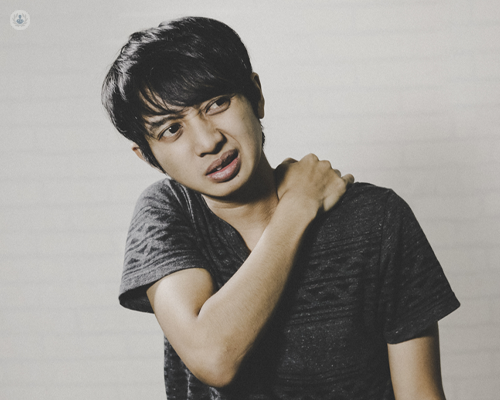Managing your recovery after shoulder stabilisation surgery
Written in association with:Shoulder stabilisation surgery is often performed to address recurrent shoulder dislocations or instability. Post-operative care and a structured recovery plan are crucial to ensure optimal healing and return to normal activities. Here’s what you need to know about managing your recovery after shoulder stabilisation surgery:

What should I expect immediately after surgery?
In the initial phase following surgery, patients can expect their arm to be immobilised in a sling. This helps to protect the shoulder and allow the surgical site to heal properly. The sling is usually worn for a few weeks, depending on the surgeon’s recommendations. Swelling, pain and stiffness are common immediately post-surgery, but these can be managed with prescribed pain medications and anti-inflammatory drugs.
Managing pain and swelling
Pain management is an essential part of recovery. Your doctor will prescribe medications to help control pain during the early stages. Icing the shoulder regularly, as advised by your healthcare provider, can also help reduce swelling and discomfort. Ensure to follow any guidance on when and how long to apply ice to avoid skin damage.
The role of physiotherapy
Physiotherapy plays a crucial role in the recovery process. After an initial period of immobilisation, your doctor will recommend beginning physiotherapy to gradually restore range of motion and strengthen the shoulder muscles. A tailored physiotherapy programme will help to regain shoulder stability and prevent future dislocations. It’s essential to follow the physiotherapist’s instructions and not rush the rehabilitation process to avoid complications.
When should I return to daily activities?
Patients are typically advised to avoid heavy lifting, strenuous activities and sports during the early recovery period. Light daily activities can be gradually resumed as the shoulder heals, but full return to sports and heavy physical tasks may take several months, depending on the complexity of the surgery and individual progress. Your surgeon and physiotherapist will guide you on safe timelines for returning to various activities.
Lifestyle tips for a smoother recovery
- Follow medical advice: Adhering to the surgeon's and physiotherapist’s recommendations is crucial for a successful recovery.
- Get adequate rest: Ensuring enough sleep and rest will aid in the healing process.
- Eat a balanced diet: Nutrition plays a key role in recovery. Eating foods rich in protein, vitamins and minerals can support tissue repair and overall health.
- Stay positive and patient: Recovery can be a slow process, but maintaining a positive outlook and patience will help you stay motivated.
Monitoring for complications
It’s important to keep an eye out for any signs of complications, such as increased pain, swelling or redness around the surgical site, or fever. If you experience any of these symptoms or have concerns about your recovery, contact your healthcare provider promptly.
Recovery after shoulder stabilisation surgery requires a combination of rest, pain management, physiotherapy and gradual return to activity. Following your healthcare provider’s instructions, participating in a structured rehabilitation programme and listening to your body are key to achieving the best outcomes. With proper care and time, most patients can regain strength and stability in their shoulder and return to their normal activities.


